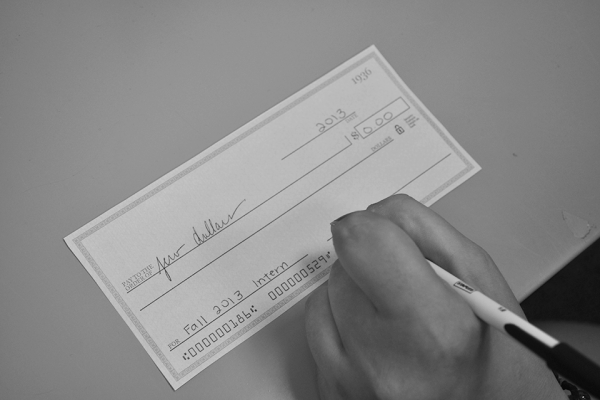Payment of Media Internships May Change
This movement allows for students from a wide range of socioeconomic backgrounds to work internships. (PHOTO BY JESSICA HANLEY/THE OBSERVER)
August 26, 2015
Unpaid internships seemed to be a thing of the past after a federal district court judge in Manhattan, William H. Pauley III, ruled that Fox Searchlight studios broke New York and federal minimum wage laws by not paying two interns who worked on the set of “Black Swan.” However, the tide took a turn in favor of media companies on July 2 2015, Fox Searchlight won their appeal in favor of unpaid internships. So, what could this mean for Fordham students and the internship experience?
“Generally, most internships at big corporations tend to be very valuable, and most of them, up until recently, have been unpaid,” Brian Rose, professor of communications and media studies, said.
The movement towards making internships paid allows more students from different socioeconomic backgrounds the opportunity to have them.
“If people have wealthy parents then the experience is worth more than the money, but students not in that situation it is different,” Hugh Hansen, professor of media and law and the director of the Fordham Intellectual Property Law Institute, said. Students that need to make money during the year are left at a disadvantage, considering most will not be able to spend time they could be working for profit at an unpaid internship position.
Along with that, Hansen believes big companies are exploiting students and young graduates by not paying interns. “I think it is wrong when companies that have the money to pay their interns and they are just trying to reduce their bottom line,” Hansen said. Many large companies have the money to pay their interns but it wasn’t until cases like the Charlie Rose Action Litigation in 2012 that media companies made the switch to paying interns. Some large companies still have some unpaid internships, despite all of the lawsuits, like CBS where I am interning this semester.
“If you just take a lot of interns in and you’re not paying anything people can get lost in the shuffle, and not get supervised properly.” Hansen said. “They may be doing things that are not actually a learning experience.” These types of internships are not beneficial to the student other than something they can put on their resume.
Offering college credit is normally how most companies get around paying their interns. However, there are mixed feelings about whether or not that is a fair trade.
“Some of them end up doing work that absolutely should be compensated. Others do very valuable work, and is not something that any employee has previously been paid for, and companies have done their best to provide these unpaid interns with a valuable academic experience,” Rose said.
According to Rose, these are the six pieces of criteria that the Department of Justice established to test if the unpaid internship is lawful:
- The internship, even though it includes actual operation of the facilities of the employer, is similar to training which would be given in an educational environment;
- The internship experience is for the benefit of the intern;
- The intern does not displace regular employees, but works under close supervision of existing staff;
- The employer that provides the training derives no immediate advantage from the activities of the intern; and on occasion its operations may actually be impeded;
- The intern is not necessarily entitled to a job at the conclusion of the internship; and
- The employer and the intern understand that the intern is not entitled to wages for the time spent in the internship.
Rose went on not discouraging students from taking unpaid internships. He teaches the internship seminar course at the Lincoln Center campus. “I think that 80 percent of the class has a very good experience with their unpaid internship, and that is traditionally what internships have been.”
Offering college credit is normally how most companies get around paying their interns. However, there are mixed feelings about whether or not that is a fair trade. “I don’t think there is any question that it is exploitation,” Rose said in regard to receiving college credit. Others think that it would be an incentive to take an unpaid internship. Chelsea Landman, (FCLC ’16), who has had a paid internship at Sesame Street Workshop, said “I would take an unpaid internship if I felt that the position would be a valuable enough learning and networking experience, and I could get school credit for it.”
The legal disputes that led to many interns getting payment was a victory for undercompensated interns But, “now that Fox Searchlight has won their appeal, I think that the movement is to start paying interns over the past year is probably going to go back now,” Rose said.
However, the appeal was only just won in July. Considering the win is so recent, “it is really anyone’s guess what is going to happen,” Rose stated. “Whether the trend will continue, we really don’t know.”
If students are unsure whether they should be compensated for their unpaid internship, visit http://unpaidinternslawsuit.com/.









